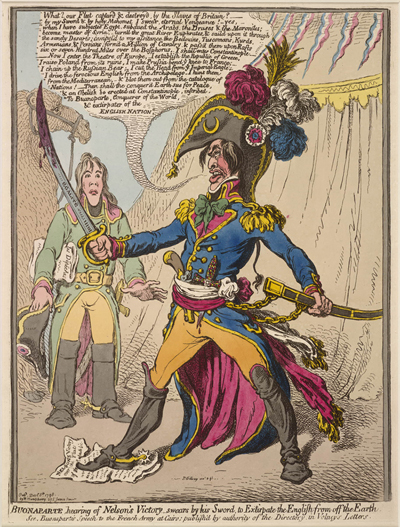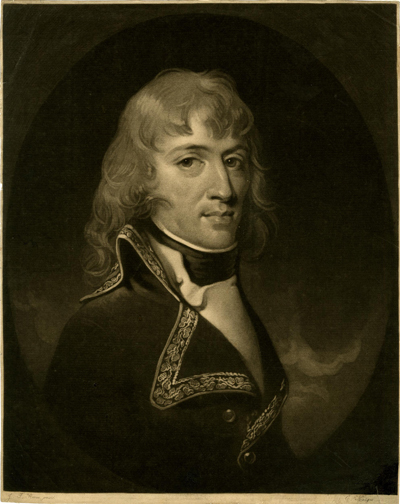Buonaparte, Hearing of Nelson's Victory. . .
This is the last of seven prints created by Gillray in fairly quick succession between October and December 1798 in reaction to Horatio Nelson's resounding victory over the French navy at the Battle of the Nile. The first one, Nelson's Victory, or Good-News Operating upon Loyal Feelings, appeared just a week after news of Nelson's success reached London. It portrayed a series of ironically appropriate reactions to the news from the most prominent Whigs. In this one we get the reaction from Buonaparte's side. It shows a blustering and belligerent Napoleon standing outside his tent having just received the unfortunate dispatch from the young messenger whose camel appears in the background. Treading angrily on the news of "Nelson's Victory," Buonaparte waves a bloody sword and threatens to "Extirpate the English from the Earth."

© Trustees of the British Museum
What? our Fleet captur'd & destroy'd by the Slaves of Britain? \ - by my Sword & by holy Mahomet I swear eternal Vengeance! - yes, \ - when I have subjected Egypt, subdued the Arabs, the Druses & the Maronites; \ become master of Syria, - turn'd the great River Euphrates, & saild upon it through \ the sandy Desarts; compel'd to my assitance [sic], the Bedouins, Tuscomans [sic], Kurds, \ Armenians, & Persians; form'd a Million of Cavalry, & pass'd them upon Rafts \ six or Seven Hundred Miles over the Bosphorus, I shall enter Constantinople - \ - Now I enter the Theatre of Europe, I establish the Republic of Greece, \ I raise Poland from its ruins, I make Prussia bend ye knee to France; - \ I chain up the Russian Bear, I cut the Head from ye Imperial Eagle; \ I drive the ferocious English from the Archipelago - I hunt them \ from the Mediterranean, - & blot them out from the catalogue of \ Nations! - Then shall the conquer'd Earth sue for Peace, \ & an Obelisk be erected at Constantinople, inscribed \ To Buanoparte [sic] Conqueror of the World, \ & extirpater of the \ ENGLISH NATION.
As the British Museum commentary suggests, the words Gillray puts in Napoleon's mouth are a parody of those ascribed to Buonaparte by his friend, the French Historian and Travel writer, Comte de Volney and may have been suggested by Buonaparte himself. The complete text was translated by the British newspapers shortly before Gillray's print appeared. But in comparing Volney's version with Gillray's, we can see how Gillray has skillfully transformed what appears to be a long-range plan of conquest (in Volney's version) into an impossible list of objectives that have to be met before England can be defeated (in Gillray's).
This is only the second time General Buonaparte appears in Gillray's work by name, and the image of Napoleon is far different from Gillray's later iconic "Little Boney." It perhaps most resembles an angry version of the formal mezzotint of the General produced in 1797 by Charles Howard Hodges who worked as an agent for William Humphrey in Holland. The connection with Hannah Humphrey's brother makes it possble (or even likely) that Gillray would have had an opportunity to see the mezzotint.

General Buonaparte
[1797]
© Trustees of the British Museum
Sources and Reading
- Commentary from the British Museum on Buonaparte, Hearing of Nelson's Victory.
- Tim Clayton & Sheila O'Connell, Bonaparte and the British, 2015. #26, p. 77.
- "Napoleon," Wikipedia
- "Battle of the Nile," Wikipedia
- "Volney, Constantin-François de Chasseboeuf, Comte de (1757-1820)," Encyclopedia.Com
- Thomas Wright and R.H. Evans, Historical and Descriptive Account of the Caricatures of James Gillray #218
- Thomas Wright and Joseph Grego, The Works of James Gillray, the Caricaturist; With the History of His Life and Times p. 249.
Comments & Corrections
NOTE: Comments and/or corrections are always appreciated. To make that easier, I have included a form below that you can use. I promise never to share any of the info provided without your express permission.